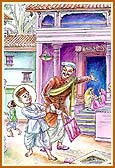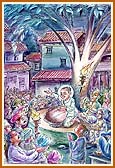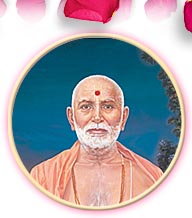 |
 |
He
was sent to the village school to study under Gangaram Mehtaji
in Samvat year 1930. His memory was very sharp and his intelligence
was high which enabled him to memorise all the lessons immediately.
The teacher too became very fond of him and began to give more
and more attention to him. Dungar Bhakta, of course, had determined
to stand first in his studies, and if he became a sadhu he would
attain the first rank in that order as well. Thus, he learnt a
lot in short time.
Besides learning in school, he began to learn all the scriptures
of the satsang (fellowship) and also Bhagvat from the saints visiting
the Mahelav temple. Even at the tender age of nine, whenever there
was no sadhu available in the temple, it was he who gave discourses
to the devout gathering. Everyone listened to him spell-bound.
All the residents of Mahelav showered affection on him because
of such virtues.
Ravjibhai of Mahelav had no children. He would watch with fascination
Dungar Bhakta going to school everyday and yearned to have such
a son in his family befitting his wealth. Once he asked Dungar
Bhakta, "Will you come to my house and stay with me, Dungar?
I shall admit you in the English school of Petlad for higher studies
and make you a big officer of the British Government."
Dungar Bhakta laughed at this suggestion and replied : "I
do not want to undertake that type of education which would qualify
me to take up mere service and render me dependent on others.
I shall, instead, become a sadhu and a learned pundit, and teach
Brahmavidya (spiritual science) to others."
Dungar Bhakta had also a unique artistic sense. People in Ravjibhai's
house were worried as to where to hang the glass chandelier. Dungar
Bhakta on learning this at once suggested : "If you hang
it on the first floor, it will look good." And, sure enough,
the splendour of the house was enhanced by such an arrangement.
Similarly his suggestion that the portico of the Vaishnav temple
would look much better if round pillars were installed there also
received prompt commendation. He also advised the carpenter to
prepare for the Mahelav temple the same kind of throne for Thakorji
as was placed in the assembly hall in the temple at Vadtal. Thus
everyone admired his keen observation and aesthetic sense.
Even at that young age he could memorise scriptural tales on hearing
but once from a kathakar (teller of scriptural tales) visiting
the village. Once a manabhatt (bard) from Vaso came to the village
to recite the story of Mahabharat accompanied by the beating of
the mana (metal pot). Dungar Bhakta soon memorised the story.
Half-way through the recitation, the Brahmin fell ill and died
shortly thereafter. The recital remained incomplete. The village
people, seeing Dungar Bhakta's devotion, pressed him to complete
the recital. Dungar Bhakta, therefore, took his seat at the village
square and beating the metal pot in the traditional style of the
Manabhatt recited the story beautifully. The village people were
much thrilled.
Dungar Bhakta now became known as the "Bhagat." Everyone
began to love him all the more. When saints came to the temple
he was offered the front seat in the congregation before discourses
would begin. After listening to their talks, he would recite them
from memory in the absence of the saints in the temple. Thus,
he did not allow their absence to be felt.
|









